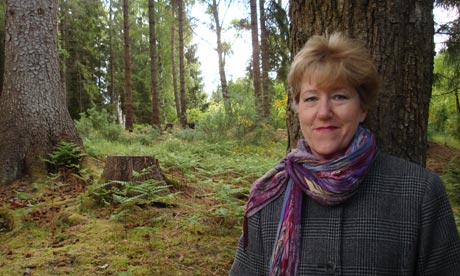After being dropped by her publisher because of poor sales, Linda Gillard decided to publish her next novel herself
• House of Silence was recommended by many readers including Jenny Woodall, GeraniumCat and rwillmer. Scroll down to recommend your own favourite self-published books
'I broke all the rules ... but I sold 10,000 downloads in less than four months' ... Linda Gillard
Why did you choose to self-publish House of Silence?
I was an award-winning, mid-list author of contemporary women's fiction when, four years ago, I was dropped by my publisher. "Disappointing sales" was the reason given. After two years my agent still hadn't managed to find a publisher for my fourth and fifth novels. Editors liked the books, but said they'd be hard to market because they belonged to no clear genre. A lot of my readers were asking when there would be a new book, so with my agent's blessing, I self-published my fourth novel, House of Silence, on Kindle.I broke all the rules. I didn't blog. I didn't tweet. I didn't publish genre fiction. It wasn't the first in a trilogy. I didn't make it free. But I sold 10,000 downloads in less than four months and Amazon UK selected it for its Top Ten Best of 2011 in the Indie Author category.
Tell us a bit about the book
House of Silence is mixed-genre. It's a country house mystery and a family drama, with an element of romantic comedy – in other words, it's a marketing nightmare. I decided to promote the genre mix and marketed the book as "Rebecca meets Cold Comfort Farm". That seemed to hit the spot with readers, who clearly don't have a problem with mixing genres.This is the blurb I wrote for the product page:
Orphaned by drink, drugs and rock'n'roll, Gwen Rowland is invited to spend Christmas at her boyfriend Alfie's family home, Creake Hall – a ramshackle Tudor manor in Norfolk. Soon after she arrives, Gwen senses something isn't quite right. Alfie acts strangely toward his family and is reluctant to talk about the past. His mother, a celebrated children's author, keeps to her room, living in a twilight world, unable to distinguish between past and present, fact and fiction.
When Gwen discovers fragments of forgotten family letters sewn into an old patchwork quilt, she starts to piece together the jigsaw of the past and realises there's more to the family history than she's been told. It seems there are things people don't want her to know. And one of those people is Alfie.
What are the positives of self-publishing?
I can say what I want to say, in the way I want to say it. I can write and sell non-genre fiction. I can have heroines in their 40s!When I was traditionally published, editors wanted to shoehorn me into the romance genre because they didn't know where else to put me, but I don't write books with pastel covers. I was writing issue-led, contemporary fiction and the issues were mental illness, PTSD, disability, bereavement, addiction and incest.
Another problem for publishers was that all my books are different. (I've written a three-generation saga, a paranormal and a love story with a 47-year-old bipolar heroine.) But variety hasn't been a problem for me as an indie because I market myself, not a genre.
It's unorthodox, but it works. I now have five indie novels on Kindle (three new, two backlist). I sell 3,000 downloads a month and earn a comfortable living from those five books. Reviews indicate that people read one book, then download others. They aren't buying a genre, they're buying a writer.
And the negatives?
Time management. Feeling overwhelmed by the all the options. Keeping up with the rate of change. But I've had a lot of support from the Alliance of Independent Authors, a professional body set up in 2012. Members are very generous with their time and expertise. If I have a query about some aspect of self-publishing, I'll post it on the Facebook group page and it will be answered within hours, sometimes minutes.Conserving writing time is the biggest challenge. It's a business and I work long hours. I have a husband who runs our home and does a lot of the technical work for me, but I still feel there aren't enough hours in the day. Book promotion can take all the time you're prepared to give it, but the best and most lucrative use of my time is always going to be writing the next book. That's why I don't blog or tweet.
But I'm very lucky. My readers promote my books for me by blogging, tweeting and talking about them. Their enthusiasm is the best kind of promotion.
More

No comments:
Post a Comment